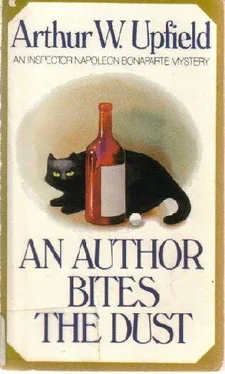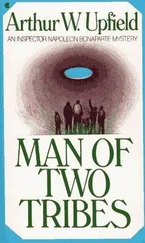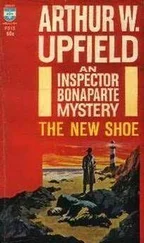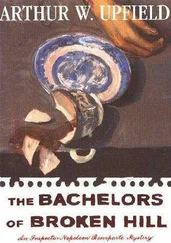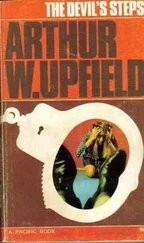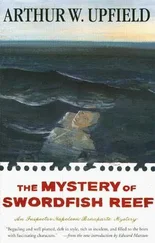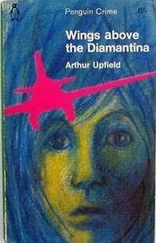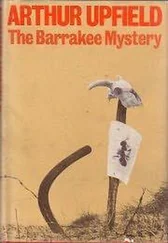Arthur Upfield - An Author Bites the Dust
Здесь есть возможность читать онлайн «Arthur Upfield - An Author Bites the Dust» весь текст электронной книги совершенно бесплатно (целиком полную версию без сокращений). В некоторых случаях можно слушать аудио, скачать через торрент в формате fb2 и присутствует краткое содержание. Жанр: Классический детектив, на английском языке. Описание произведения, (предисловие) а так же отзывы посетителей доступны на портале библиотеки ЛибКат.
- Название:An Author Bites the Dust
- Автор:
- Жанр:
- Год:неизвестен
- ISBN:нет данных
- Рейтинг книги:5 / 5. Голосов: 1
-
Избранное:Добавить в избранное
- Отзывы:
-
Ваша оценка:
- 100
- 1
- 2
- 3
- 4
- 5
An Author Bites the Dust: краткое содержание, описание и аннотация
Предлагаем к чтению аннотацию, описание, краткое содержание или предисловие (зависит от того, что написал сам автор книги «An Author Bites the Dust»). Если вы не нашли необходимую информацию о книге — напишите в комментариях, мы постараемся отыскать её.
An Author Bites the Dust — читать онлайн бесплатно полную книгу (весь текст) целиком
Ниже представлен текст книги, разбитый по страницам. Система сохранения места последней прочитанной страницы, позволяет с удобством читать онлайн бесплатно книгу «An Author Bites the Dust», без необходимости каждый раз заново искать на чём Вы остановились. Поставьте закладку, и сможете в любой момент перейти на страницу, на которой закончили чтение.
Интервал:
Закладка:
“Did you ever meet Mervyn Blake?”
“Never. And I’ve never met Wilcannia-Smythe, either.”
“Read any of his work?”
“Yes. The fellow’s a master of words. His similes are striking, and he knows how to employ paradox. But he can’t tell a story. Let me enlarge on that by comparing his work with mine. He has the mastery of words but not the gift of story-telling. I have the gift of story-telling but not the mastery of words. The great novelists have both gifts.”
“I take it that Wilcannia-Smythe’s work and that of Blake is judged to be literature.”
“Without doubt.”
“Judged by whom?”
“By the members of their societies and by those who have come to rely upon their judgment. But not by the general public.”
Bony became pensive. He lounged farther down into his chair and gazed upward at an enlarged photograph of a marlin suspended from a triangle. Chalked on the body of the fish was the name Bagshott, and beneath it the weight in hundreds of pounds. Beside it stood the angler, an insignificant dwarf.
“Ah, me!” he exclaimed and, rising to his feet, he whipped out his breast handkerchief and draped it over the picture. Sitting down again, he said, “Damn the swordfish, Bagshott.”
“Yes, damn everything. Another cup of tea?”
“Thank you. Just tell me what you know, and what you feel about the late Mervyn Blake and all this literature business. I might then see the obstacle I spoke of. I want to get inside these associates of Mervyn Blake, deeper than the police seemed able to do. If there are currents running strong and deep below the surface, tell me about them.”
“All right, I’ll blow the gaff and the baloney,” Bagshott assented. “Let’s remember that our civilization in Australia is young and still has many of the silly attributes of youth. The nation came to maturity during the First World War, and during the early twenties evinced a marked interest in the work of its authors.
“In 1918 or ’19, Mervyn Blake came to Australia from England to join the staff of the local university, and his first novel was published in the early twenties. He and a few friends founded yet another literary society in Melbourne, and they became affiliated with a similar crowd in Sydney, of which Wilcannia-Smythe was the leader.
“They barged into the few magazines and the city dailies as literary critics, and they boosted each other’s novels no end. They caught the public interest in Australian stories at the crest, and the public bought heavily on their say-so. Alas, the public found itself with second-rate novels and, quite indignantly, said, in effect, that if this was literature, it would have nothing to do with it.
“It wouldn’t, either. Immediately a bookseller or librarian offered an Australian novel, he was almost rudely told to keep it. For years public hostility to Australian fiction remained steady. TheBlakes and the Wilcannia-Smythespersisted. They went on and up in the critical field. In the production field they have gone down and down despite all the mutual backslapping.
“In the early thirties, several men and three women forged ahead as novelists. They cut right away from the gum-tree and rabbit-oh era and presented Australia as she is. They-and the Australian public-were extremely fortunate that in every capital city there were some independent critics who were not novelists with an axe to grind and who were not at all respectful of theBlakes and the Wilcannia-Smythes.
“Today, the Blake-Smythe faction is still influential,” Bagshott went on. “It’s fascist or communist in its close preserve. You are either a member and wear the halo of genius, or you are an outsider, to be ignored or condemned to writing commercial fiction. However, quite a considerable number of Australian authors are doing very well and gaining recognition in England and America.
“There is, for example, I. R. Watts. The Blake-Smythe crowd have always been blatantly hard on Watts, but his books are selling very well overseas. If you want substantiation of what I’ve said, you dig him up.”
“Met him?” asked Bony.
“Never. Don’t even know where he lives. His publishers will have his address, of course. You ask him this question-is there any possibility of internecine warfare within the Blake-Smythe combination? I don’t regard that as improbable.”
“I. R. Watts,” Bony repeated. “Could you let me have one of his books to read?”
“Yes, I can. I have also a copy of Blake’s last book. Take that, too. When you have read the first six pages of Blake’s book you’ll understand why the Australian public is hostile to Australian novels.”
“But your books sell well in Australia, don’t they?”
Bagshott grinned again, his eyes vacant of humour.
“Not as well as they would if the Australian readers hadn’t been led up the garden path by the back-slapping critic authors,” he countered.
Bagshott’s hostility towards the Blake-SmythesBony found to be an interesting facet. He accepted it with caution born of the knowledge that Bagshott was given to over-statement.
He said, “What do you know of Mrs Blake?”
“I saw her once and then didn’t speak to her,” Bagshott replied. “I think she’s more ambitious than her husband was. Her art is the short story. She writes very well and the praise of her work by the Blake-Smythesis merited. Mrs Blake does a fair amount of public speaking, and she contributes a lot to literary periodicals in which she never fails to mention her husband’s books.”
“Thanks. What of Martin Lubers, the wireless man?”
“Heard of him, of course, but I know nothing about him.”
“Twyford Arundal?”
“A poet. Limited outlook, but a good versifier.”
“Mrs Ella Montrose?”
“Wrote a couple of good novels about twenty years ago. She’s as full of repressions as a general is of bile. Husband died years ago. Nobody blamed him. She’s this and that in a dozen literary societies. Does the book reviews for theMelbournian.”
“A woman of many parts, evidently. Tell me about Marshall Ellis.”
“Marshall Ellis! Read the classics less and the newspapers more. You shouldn’t need to be informed about Marshall Ellis,” chided Bagshott. “Marshall Ellis rose to fame by crudely insulting all and sundry, in print and out. Clever bird. Uses vitriol for his ink, and carbolic acid for a gargle. Tries to apeG.K. C. Came to Australia to study growth of our national literature, and even before he left England he was captured by the Blake-Smythe combination. During his visit here, he was never allowed to wander from the fold and, without doubt, he was thoroughly stuffed by his hosts. You can wipe him off. He was just a sucker who ate the pap fed to him.”
“H’m!” Bony smiled. Clarence B. Bagshott hadn’t changed a scrap since that memorable holiday at Bermagui. “Well, then, what of Miss Nancy Chesterfield?”
“Ha-a-a!”Bagshott got to his big feet and gently closed the door. Then he exclaimed softly, “What a woman! What a-a-woman! The very thought of her makes me frantic to cast off thirty years. A glorious creature, Bony, but tough. If you could persuade her to talk heart to heart you’d get something worth while. She knows all the self-crowned highbrows in all the arts, all the members of solid society, all the racketeers, and the black marketeers, all the gambling kings and sport barons. She even knows me!”
Bony’s brows rose.
“I’m delighted to hear that,” he said. “She is, I understand, a journalist.”
“Edits the social pages of theRecorder. Writes personality pars on people who are tops,” Bagshott went on.“One weakness only. She a valuable ally of the Blake-Smythes!”
“Could you obtain an introduction for me?”
Читать дальшеИнтервал:
Закладка:
Похожие книги на «An Author Bites the Dust»
Представляем Вашему вниманию похожие книги на «An Author Bites the Dust» списком для выбора. Мы отобрали схожую по названию и смыслу литературу в надежде предоставить читателям больше вариантов отыскать новые, интересные, ещё непрочитанные произведения.
Обсуждение, отзывы о книге «An Author Bites the Dust» и просто собственные мнения читателей. Оставьте ваши комментарии, напишите, что Вы думаете о произведении, его смысле или главных героях. Укажите что конкретно понравилось, а что нет, и почему Вы так считаете.
